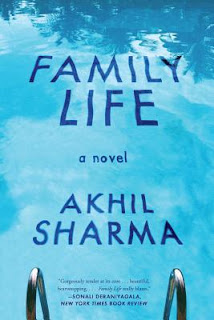Family Life
Family Life, by Akhil Sharma, is a moderately interesting story that has parallel themes: the experiences of an immigrant family from India in the United States, and the repercussions of a serious accident on that family. The book is let down, though, by a narrator who never really matures.
The book is told from the point of view of Ajay, who as the book begins is a small boy. His family moves from India to the U.S., and he is amazed by what he sees. His older brother Birju, who is very smart and ready to enter a prestigious New York City high school, is badly injured in a swimming pool accident. He has so much brain damage that he will never walk or talk again.
These are two themes that have been well-explored in literature, especially the immigrant experience which, despite the prevailing xenophobia of Republican presidential candidates, is the essence of being American. Sometimes this comes off as a Yakov Smirnoff routine, as new arrivals find things so strange and funny about the new country. Ajay, as he grows older, grows decidedly bitter about the experience, growing to hate white people,
The accident portion of the book is shaded by its being in an Indian family. The family ends up in a largely Indian community in New Jersey, and there are the social dynamics and petty jealousies that occur. This is compounded when Ajay's father, devastated by his son's injury, becomes an alcoholic. This brings shame on the family, especially when the father checks himself into Bellevue.
The book is lean and told simply. Ajay is narrating the story as he remembers it as an adult (it takes place mostly in the '70s). An interesting section has Ajay becoming obsessed with Ernest Hemingway, and fancying himself a writer. As an incident unfolds in his real life, he imagines it as a short story. But the book isn't properly Hemingwayesque, even if the narrator is, to put it mildly, a prick.
When Ajay writes about his feelings regarding his brother and then his father, we can take it with some grain of salt because he is young, but it finally occurred to me that he was just a not very nice person. He himself puts it best: "Many of the boys at school disliked me. I was arrogant and annoying. I would boast about my grades while simultaneously whining about having to work." Yes--arrogant and annoying.
A pungent section has Ajay accompanying his father to AA meetings. He is aghast--he wants to tell them that they are white people, they have no problems. He says, "To me, it seemed very American to call drinking a disease and therefore avoid responsibility."
Do we need to like the narrator of a book? I don't think so, but the unpleasant aspects of Ajay, plus the somewhat quotidian nature of the action, sunk this book for me. I was especially let down because this book was named one of the ten best of the year by the New York Times. No.
The book is told from the point of view of Ajay, who as the book begins is a small boy. His family moves from India to the U.S., and he is amazed by what he sees. His older brother Birju, who is very smart and ready to enter a prestigious New York City high school, is badly injured in a swimming pool accident. He has so much brain damage that he will never walk or talk again.
These are two themes that have been well-explored in literature, especially the immigrant experience which, despite the prevailing xenophobia of Republican presidential candidates, is the essence of being American. Sometimes this comes off as a Yakov Smirnoff routine, as new arrivals find things so strange and funny about the new country. Ajay, as he grows older, grows decidedly bitter about the experience, growing to hate white people,
The accident portion of the book is shaded by its being in an Indian family. The family ends up in a largely Indian community in New Jersey, and there are the social dynamics and petty jealousies that occur. This is compounded when Ajay's father, devastated by his son's injury, becomes an alcoholic. This brings shame on the family, especially when the father checks himself into Bellevue.
The book is lean and told simply. Ajay is narrating the story as he remembers it as an adult (it takes place mostly in the '70s). An interesting section has Ajay becoming obsessed with Ernest Hemingway, and fancying himself a writer. As an incident unfolds in his real life, he imagines it as a short story. But the book isn't properly Hemingwayesque, even if the narrator is, to put it mildly, a prick.
When Ajay writes about his feelings regarding his brother and then his father, we can take it with some grain of salt because he is young, but it finally occurred to me that he was just a not very nice person. He himself puts it best: "Many of the boys at school disliked me. I was arrogant and annoying. I would boast about my grades while simultaneously whining about having to work." Yes--arrogant and annoying.
A pungent section has Ajay accompanying his father to AA meetings. He is aghast--he wants to tell them that they are white people, they have no problems. He says, "To me, it seemed very American to call drinking a disease and therefore avoid responsibility."
Do we need to like the narrator of a book? I don't think so, but the unpleasant aspects of Ajay, plus the somewhat quotidian nature of the action, sunk this book for me. I was especially let down because this book was named one of the ten best of the year by the New York Times. No.



Comments
Post a Comment